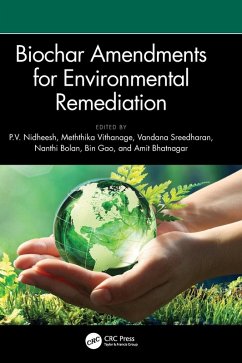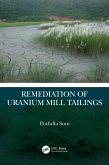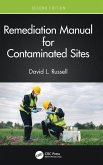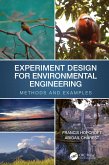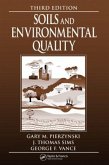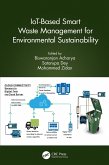Biochar Amendments for Environmental Remediation
Herausgeber: Nidheesh, P V; Bhatnagar, Amit; Gao, Bin; Bolan, Nanthi; Sreedharan, Vandana; Vithanage, Meththika
Biochar Amendments for Environmental Remediation
Herausgeber: Nidheesh, P V; Bhatnagar, Amit; Gao, Bin; Bolan, Nanthi; Sreedharan, Vandana; Vithanage, Meththika
- Gebundenes Buch
- Merkliste
- Auf die Merkliste
- Bewerten Bewerten
- Teilen
- Produkt teilen
- Produkterinnerung
- Produkterinnerung
This book provides an overall view of biochar production, its properties, and its various environmental applications and in-depth knowledge on biochar in respective environmental protection measures. Real field implementations and challenges associated with real field implementation of developed processes/technologies are illustrated as well.
Andere Kunden interessierten sich auch für
![Designer Biochar Assisted Bioremediation of Industrial Effluents Designer Biochar Assisted Bioremediation of Industrial Effluents]() Designer Biochar Assisted Bioremediation of Industrial Effluents176,99 €
Designer Biochar Assisted Bioremediation of Industrial Effluents176,99 €![Soil Remediation Soil Remediation]() Soil Remediation153,99 €
Soil Remediation153,99 €![Remediation of Uranium Mill Tailings Remediation of Uranium Mill Tailings]() Prafulla SoniRemediation of Uranium Mill Tailings154,99 €
Prafulla SoniRemediation of Uranium Mill Tailings154,99 €![Remediation Manual for Contaminated Sites Remediation Manual for Contaminated Sites]() David L RussellRemediation Manual for Contaminated Sites132,99 €
David L RussellRemediation Manual for Contaminated Sites132,99 €![Experiment Design for Environmental Engineering Experiment Design for Environmental Engineering]() Francis J HopcroftExperiment Design for Environmental Engineering163,99 €
Francis J HopcroftExperiment Design for Environmental Engineering163,99 €![Soils and Environmental Quality Soils and Environmental Quality]() Gary M PierzynskiSoils and Environmental Quality153,99 €
Gary M PierzynskiSoils and Environmental Quality153,99 €![Iot-Based Smart Waste Management for Environmental Sustainability Iot-Based Smart Waste Management for Environmental Sustainability]() Iot-Based Smart Waste Management for Environmental Sustainability132,99 €
Iot-Based Smart Waste Management for Environmental Sustainability132,99 €-
-
-
This book provides an overall view of biochar production, its properties, and its various environmental applications and in-depth knowledge on biochar in respective environmental protection measures. Real field implementations and challenges associated with real field implementation of developed processes/technologies are illustrated as well.
Hinweis: Dieser Artikel kann nur an eine deutsche Lieferadresse ausgeliefert werden.
Hinweis: Dieser Artikel kann nur an eine deutsche Lieferadresse ausgeliefert werden.
Produktdetails
- Produktdetails
- Verlag: CRC Press
- Seitenzahl: 364
- Erscheinungstermin: 27. November 2024
- Englisch
- Abmessung: 254mm x 178mm x 22mm
- Gewicht: 880g
- ISBN-13: 9781032383903
- ISBN-10: 1032383909
- Artikelnr.: 70945603
- Herstellerkennzeichnung
- Libri GmbH
- Europaallee 1
- 36244 Bad Hersfeld
- gpsr@libri.de
- Verlag: CRC Press
- Seitenzahl: 364
- Erscheinungstermin: 27. November 2024
- Englisch
- Abmessung: 254mm x 178mm x 22mm
- Gewicht: 880g
- ISBN-13: 9781032383903
- ISBN-10: 1032383909
- Artikelnr.: 70945603
- Herstellerkennzeichnung
- Libri GmbH
- Europaallee 1
- 36244 Bad Hersfeld
- gpsr@libri.de
P.V. Nidheesh completed his BTech in Civil Engineering from Government College of Engineering, Kannur, Kerala, India; MTech in Environmental Engineering; and PhD from National Institute of Technology Trichy, Tamilnadu, India. After the completion of his doctoral degree, he worked as an adhoc faculty at National Institute of Technology Calicut, Kerala, India and as an associate professor at Vimal Jyothi Engineering College, Chemperi, Kannur, Kerala, India. Currently he is working as a principal scientist at CSIR-National Environmental Engineering Research Institute, Nagpur, India. His research interests include water, wastewater treatment, and advanced oxidation processes. He has published several international journal articles, conference articles, books, and book chapters. He is an author of highly cited and highly downloaded articles. He is one of the most highly cited researcher of 2023. He is serving as an editorial member for journals including Environmental Research, Environmental Technology, Environmental Advances, Soil and Environmental Health, Water, European Journal of Chemistry, and Environmental Quality Management. Meththika Vithanage is an esteemed Professor and founding director of the Ecosphere Resilience Research Centre at the University of Sri Jayewardenepura, Sri Lanka, her pioneering vision has propelled her to the forefront of global scholarship. Prof. Vithanage's influence extends far beyond her home institution, as evidenced by her roles as an Adjunct Professor at the Institute of Agriculture, University of Western Australia, Sustainability Cluster, University of Petroleum and Energy Studies, India and the National Institute of Fundamental Studies, Sri Lanka. Recently appointed as an Eminent Visiting Scientist at the Saveetha Institute of Medical and Technical Sciences, India, she continues to illuminate pathways for innovative research and collaboration. With a multifaceted academic background spanning water chemistry, environmental remediation, microplastics, and waste biomass conversion, Prof. Vithanage has earned international acclaim for her groundbreaking contributions. Vandana Sreedharan is a seasoned academician in the field of geo environmental engineering at Government College of Engineering Kannur, India. Her research interests include use of sustainable materials for environmental control, modifying clays for use in engineered barriers and soil improvement. Through her research she has explored multi-disciplinary approaches and Vandana's dedication to her field is evident in her commitment to integrate sustainability and resilience in geo environmental systems. Nanthi Bolan is the Professor of Soil Science at the School of Agriculture and Environment, The University of Western Australia. He is leading the Soil Carbon Research group within the school. Nanthi's teaching and research interests include agronomic value of manures, fertilisers and soil amendments, soil acidification, nutrient and carbon cycling, pesticide and metal pollutants interactions in soils, greenhouse gas emission, soil remediation, mine site revegetation, and waste and wastewater management. Bin Gao is the Kodak Chair Professor in the Department of Civil and Environmental Engineering at Rensselaer Polytechnic Institute. Prior to this, he was a professor at University of Florida, a research associate at Cornell University, and a postdoctoral research associate at Yale University. He earned his PhD degree at Cornell University and his B.S. and M.S. degrees at Nanjing University. Prof. Gao's research mainly focuses on biochar, environmental nanotechnology, and contaminant fate and transport. He has an extensive list of publications in the field of environmental science and engineering. Amit Bhatnagar is a Full Professor of Wate Treatment at the Department of Separation Science, LUT University, Finland. He is the Group Leader of Water Treatment and Algal Biotechnology Research at LUT University. He is also Head of the Master's Degree program of Water Technology at LUT University. Earlier, he worked as a faculty at the University of Eastern Finland (2014-2020). He was awarded reputed research fellowships and conducted his postdoctoral research in various countries (Sweden, Portugal, Germany, Finland, South Korea, India, and Switzerland). Bhatnagar's research interests include wastewater treatment, carbon capture (biofixation) and resource recovery using microalgae and microalgal consortium and the production of value-added products from algal biomass.
Section 1 Production, Characterization and Applications of Biochar 1.
Methods of Biochar Production, Its Modifications, and Characterization 2.
Challenges in Pilot-Scale Biochar Production Section 2 Biochar in Air
Pollution Control and Climate Change Mitigation 3. Application of Biochar
for the Removal of Volatile Organic Compounds 4. Exploring the Potential of
Biomass-Derived Biocoal as an Alternative Fuel: Characteristics, Combustion
Performance, and Environmental Implications 5. Role of Biochar in Achieving
Climate Resilience and Climate Change Mitigation 6. Application of Biochar
for Achieving Carbon Neutrality Section 3 Biochar for Soil Decontamination
7. Biochar-Assisted (Facilitated) Immobilization of Heavy Metals in Soil 8.
Biochar Applications for Remediating Salt-Affected Soils 9. Biochar: An
Emerging Solution for Mine Land Reclamation 10. Biochar for Treating
Polluted Sediments 4 Role of Biochar in Solid Waste and Sludge Management
11. Biochar-Based Biocover to Reduce Landfill CH4 and H2S Emissions 12.
Biochar Enhanced Sludge Management 13. Biochar to Enhance Environmental
Remediation in Composting 5 Emerging Applications of Biochar in Water and
Wastewater Treatment 14. Removal of Emerging Contaminants and
Micropollutants from the Aquatic Environment Using Biochar 15. Development
of Antibacterial Biochar Nanocomposite and Its Application in Wastewater
Treatment 16. Modified Biochars and the Applications in Water and
Wastewater Treatment 17. Biochar-Based Permeable Reactive Barriers 18.
Resource Recovery from Wastewater by Biochar 19. Biochar in Subsurface
Wastewater Infiltration Systems and in Constructed Wetlands 20.
Biochar-Based Activation of Peroxides for Advanced Oxidation Treatment of
Water and Wastewater 21. Biochar-Based Microbial Fuel Cell 6 Real Field
Implementations and Challenges 22. Potential Health Risks Associated with
Biochar-From Production to Field Application 23. Environmental Risks
Associated with Biochar Applications 24. Life Cycle and Cost-Benefit
Analysis of Biochar 25. Optimizing Biochar Supply Chains for Carbon Dioxide
Removal: A Review of Network Models 26. Biochar Filters and Its Application
in Drinking Water Treatment 27. Sustainable Applications of Biochar for
Environmental Control and Promotion of the Circular Economy
Methods of Biochar Production, Its Modifications, and Characterization 2.
Challenges in Pilot-Scale Biochar Production Section 2 Biochar in Air
Pollution Control and Climate Change Mitigation 3. Application of Biochar
for the Removal of Volatile Organic Compounds 4. Exploring the Potential of
Biomass-Derived Biocoal as an Alternative Fuel: Characteristics, Combustion
Performance, and Environmental Implications 5. Role of Biochar in Achieving
Climate Resilience and Climate Change Mitigation 6. Application of Biochar
for Achieving Carbon Neutrality Section 3 Biochar for Soil Decontamination
7. Biochar-Assisted (Facilitated) Immobilization of Heavy Metals in Soil 8.
Biochar Applications for Remediating Salt-Affected Soils 9. Biochar: An
Emerging Solution for Mine Land Reclamation 10. Biochar for Treating
Polluted Sediments 4 Role of Biochar in Solid Waste and Sludge Management
11. Biochar-Based Biocover to Reduce Landfill CH4 and H2S Emissions 12.
Biochar Enhanced Sludge Management 13. Biochar to Enhance Environmental
Remediation in Composting 5 Emerging Applications of Biochar in Water and
Wastewater Treatment 14. Removal of Emerging Contaminants and
Micropollutants from the Aquatic Environment Using Biochar 15. Development
of Antibacterial Biochar Nanocomposite and Its Application in Wastewater
Treatment 16. Modified Biochars and the Applications in Water and
Wastewater Treatment 17. Biochar-Based Permeable Reactive Barriers 18.
Resource Recovery from Wastewater by Biochar 19. Biochar in Subsurface
Wastewater Infiltration Systems and in Constructed Wetlands 20.
Biochar-Based Activation of Peroxides for Advanced Oxidation Treatment of
Water and Wastewater 21. Biochar-Based Microbial Fuel Cell 6 Real Field
Implementations and Challenges 22. Potential Health Risks Associated with
Biochar-From Production to Field Application 23. Environmental Risks
Associated with Biochar Applications 24. Life Cycle and Cost-Benefit
Analysis of Biochar 25. Optimizing Biochar Supply Chains for Carbon Dioxide
Removal: A Review of Network Models 26. Biochar Filters and Its Application
in Drinking Water Treatment 27. Sustainable Applications of Biochar for
Environmental Control and Promotion of the Circular Economy
Section 1 Production, Characterization and Applications of Biochar 1.
Methods of Biochar Production, Its Modifications, and Characterization 2.
Challenges in Pilot-Scale Biochar Production Section 2 Biochar in Air
Pollution Control and Climate Change Mitigation 3. Application of Biochar
for the Removal of Volatile Organic Compounds 4. Exploring the Potential of
Biomass-Derived Biocoal as an Alternative Fuel: Characteristics, Combustion
Performance, and Environmental Implications 5. Role of Biochar in Achieving
Climate Resilience and Climate Change Mitigation 6. Application of Biochar
for Achieving Carbon Neutrality Section 3 Biochar for Soil Decontamination
7. Biochar-Assisted (Facilitated) Immobilization of Heavy Metals in Soil 8.
Biochar Applications for Remediating Salt-Affected Soils 9. Biochar: An
Emerging Solution for Mine Land Reclamation 10. Biochar for Treating
Polluted Sediments 4 Role of Biochar in Solid Waste and Sludge Management
11. Biochar-Based Biocover to Reduce Landfill CH4 and H2S Emissions 12.
Biochar Enhanced Sludge Management 13. Biochar to Enhance Environmental
Remediation in Composting 5 Emerging Applications of Biochar in Water and
Wastewater Treatment 14. Removal of Emerging Contaminants and
Micropollutants from the Aquatic Environment Using Biochar 15. Development
of Antibacterial Biochar Nanocomposite and Its Application in Wastewater
Treatment 16. Modified Biochars and the Applications in Water and
Wastewater Treatment 17. Biochar-Based Permeable Reactive Barriers 18.
Resource Recovery from Wastewater by Biochar 19. Biochar in Subsurface
Wastewater Infiltration Systems and in Constructed Wetlands 20.
Biochar-Based Activation of Peroxides for Advanced Oxidation Treatment of
Water and Wastewater 21. Biochar-Based Microbial Fuel Cell 6 Real Field
Implementations and Challenges 22. Potential Health Risks Associated with
Biochar-From Production to Field Application 23. Environmental Risks
Associated with Biochar Applications 24. Life Cycle and Cost-Benefit
Analysis of Biochar 25. Optimizing Biochar Supply Chains for Carbon Dioxide
Removal: A Review of Network Models 26. Biochar Filters and Its Application
in Drinking Water Treatment 27. Sustainable Applications of Biochar for
Environmental Control and Promotion of the Circular Economy
Methods of Biochar Production, Its Modifications, and Characterization 2.
Challenges in Pilot-Scale Biochar Production Section 2 Biochar in Air
Pollution Control and Climate Change Mitigation 3. Application of Biochar
for the Removal of Volatile Organic Compounds 4. Exploring the Potential of
Biomass-Derived Biocoal as an Alternative Fuel: Characteristics, Combustion
Performance, and Environmental Implications 5. Role of Biochar in Achieving
Climate Resilience and Climate Change Mitigation 6. Application of Biochar
for Achieving Carbon Neutrality Section 3 Biochar for Soil Decontamination
7. Biochar-Assisted (Facilitated) Immobilization of Heavy Metals in Soil 8.
Biochar Applications for Remediating Salt-Affected Soils 9. Biochar: An
Emerging Solution for Mine Land Reclamation 10. Biochar for Treating
Polluted Sediments 4 Role of Biochar in Solid Waste and Sludge Management
11. Biochar-Based Biocover to Reduce Landfill CH4 and H2S Emissions 12.
Biochar Enhanced Sludge Management 13. Biochar to Enhance Environmental
Remediation in Composting 5 Emerging Applications of Biochar in Water and
Wastewater Treatment 14. Removal of Emerging Contaminants and
Micropollutants from the Aquatic Environment Using Biochar 15. Development
of Antibacterial Biochar Nanocomposite and Its Application in Wastewater
Treatment 16. Modified Biochars and the Applications in Water and
Wastewater Treatment 17. Biochar-Based Permeable Reactive Barriers 18.
Resource Recovery from Wastewater by Biochar 19. Biochar in Subsurface
Wastewater Infiltration Systems and in Constructed Wetlands 20.
Biochar-Based Activation of Peroxides for Advanced Oxidation Treatment of
Water and Wastewater 21. Biochar-Based Microbial Fuel Cell 6 Real Field
Implementations and Challenges 22. Potential Health Risks Associated with
Biochar-From Production to Field Application 23. Environmental Risks
Associated with Biochar Applications 24. Life Cycle and Cost-Benefit
Analysis of Biochar 25. Optimizing Biochar Supply Chains for Carbon Dioxide
Removal: A Review of Network Models 26. Biochar Filters and Its Application
in Drinking Water Treatment 27. Sustainable Applications of Biochar for
Environmental Control and Promotion of the Circular Economy

